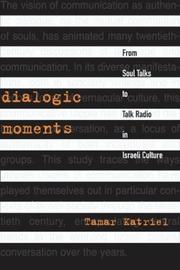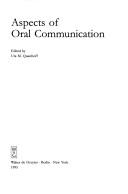Book
ISBN: 951648865X Year: 1982 Publisher: Åbo Åbo akademi
Abstract | Keywords | Export | Availability | Bookmark
 Loading...
Loading...Choose an application
- Reference Manager
- EndNote
- RefWorks (Direct export to RefWorks)
Oral communication --- -Oral transmission --- Speech communication --- Verbal communication --- Communication --- Congresses --- -Congresses --- -Congresses. --- Congresses.
Book
ISBN: 0944811140 Year: 1994 Publisher: [Place of publication not identified] Speech Communication Association
Abstract | Keywords | Export | Availability | Bookmark
 Loading...
Loading...Choose an application
- Reference Manager
- EndNote
- RefWorks (Direct export to RefWorks)
Oral communication --- Journalism & Communications --- Communication & Mass Media --- History --- Oral transmission --- Speech communication --- Verbal communication --- Communication

ISBN: 0814337503 9780814337509 0814327745 9780814327746 0814327753 9780814327753 Year: 2004 Publisher: Detroit Wayne State University Press
Abstract | Keywords | Export | Availability | Bookmark
 Loading...
Loading...Choose an application
- Reference Manager
- EndNote
- RefWorks (Direct export to RefWorks)
Oral communication --- Oral transmission --- Speech communication --- Verbal communication --- Communication --- History. --- History --- Annals --- Auxiliary sciences of history
Book
ISBN: 1299104274 1609947444 9781609947446 9781609947453 1609947452 9781609947439 1609947436 9781299104273 Year: 2013 Publisher: San Francisco : Berrett-Koehler Publishers, Inc.,
Abstract | Keywords | Export | Availability | Bookmark
 Loading...
Loading...Choose an application
- Reference Manager
- EndNote
- RefWorks (Direct export to RefWorks)
The must-have book for everyone who wants to be heard. More than just a book on business speech, it looks at the range of common communication mistakes--from repeating oneself to speaking too quckly--that can result in a poor impression.
Oral communication. --- Oral transmission --- Speech communication --- Verbal communication --- Communication --- Oral communication --- E-books
Book
ISBN: 2213603863 9782213603865 Year: 1999 Publisher: [Paris] : Fayard,
Abstract | Keywords | Export | Availability | Bookmark
 Loading...
Loading...Choose an application
- Reference Manager
- EndNote
- RefWorks (Direct export to RefWorks)
Six conférences données à la BBC sur le ton de la conversation. Une réflexion philosophique légère comme un mot d'esprit sur tout et rien : la parole dans la famille. Pourquoi les amants ne parviennent-ils jamais à dire ce qu'ils ressentent? Pourquoi les hommes ont-ils du mal à parler d'eux-mêmes? Faut-il toujours dire ce que l'on pense? Dans quelles situations faut-il se taire?
CDL --- 8 --- Conversation --- Oral communication --- Oral transmission --- Speech communication --- Verbal communication --- Communication --- Talking --- Colloquial language --- Etiquette
Book
ISBN: 224709791X 9782247097913 Year: 2008 Publisher: Paris : Dalloz,
Abstract | Keywords | Export | Availability | Bookmark
 Loading...
Loading...Choose an application
- Reference Manager
- EndNote
- RefWorks (Direct export to RefWorks)
French language --- Oral communication. --- Oral transmission --- Speech communication --- Verbal communication --- Communication --- Composition and exercises.
Book
Year: 2008 Publisher: Darmstadt : Büchner-Verlag,
Abstract | Keywords | Export | Availability | Bookmark
 Loading...
Loading...Choose an application
- Reference Manager
- EndNote
- RefWorks (Direct export to RefWorks)
Why a study of political language use? The most important tool in politics is language, as an instrument with which opinions are articulated and disseminated, with which political decisions and decisions representing the will of the people are made. However, the language of politics is also a language of influence. Thus, political parties try to promote their own programs with the help of their party programs (basic programs, election programs) and in this respect represent an important as well as interesting type of text in the field of political communication. Party programs serve, for example, to promote internal party understanding, external self-presentation and as a basis for public understanding. Andreas Ickes presents the text type party program in its various variations and forms of realization. He documents those aspects of the linguistic form that are characteristic of this text type and locates the use of de type party program in the structure of political communication. The detailed presentation is underpinned with cross-party sample material, annotated text passages, or even forms of contrastive analysis. Thus, the analysis and reflection of political language use helps not only to recognize the linguistic possibilities of conveying content, but also to improve one's own critical faculties. Warum eine Untersuchung der politischen Sprachverwendung? Das wichtigste Werkzeug in der Politik ist die Sprache, als Instrument, mit dem Meinungen artikuliert und verbreitet werden, mit dem politische und den Willen des Volkes repräsentierende Entscheidungen getroffen werden. Die Sprache der Politik ist jedoch auch eine Sprache der Beeinflussung. So versuchen politische Parteien, mit Hilfe ihrer Parteiprogramme (Grundsatzprogramme, Wahlprogramme) für die eigene Programmatik zu werben und stellen insofern einen wichtigen wie interessanten Texttyp im Bereich der politischen Kommunikation dar. Die Parteiprogramme dienen etwa der innerparteilichen Verständigung, der Selbstdarstellung nach außen und als Grundlage für die Verständigung in der Öffentlichkeit. Andreas Ickes stellt den Texttyp Parteiprogramm in seinen diversen Spielarten und Realisierungsformen vor. Er dokumentiert diejenigen Aspekte der sprachlichen Gestalt, die für diesen Texttyp charakteristisch sind und verortet den Gebrauch von de Typs Parteiprogramm im Gefüge der politischen Kommunikation. Die detaillierte Darstellung ist mit parteiübergreifendem Beispielmaterial, kommentierten Textstellen oder auch Formen der kontrastiven Analyse unterfüttert. So hilft die Analyse und Reflexion der politischen Sprachverwendung, die sprachlichen Möglichkeiten der Inhaltsvermittlung nicht nur zu erkennen, sondern auch die eigene Kritikfähigkeit zu verbessern.
party program --- manifesto --- political communication --- political images --- speech communication --- political campaign speeches, political parties
Book
Year: 2008 Publisher: Darmstadt : Büchner-Verlag,
Abstract | Keywords | Export | Availability | Bookmark
 Loading...
Loading...Choose an application
- Reference Manager
- EndNote
- RefWorks (Direct export to RefWorks)
Why a study of political language use? The most important tool in politics is language, as an instrument with which opinions are articulated and disseminated, with which political decisions and decisions representing the will of the people are made. However, the language of politics is also a language of influence. Thus, political parties try to promote their own programs with the help of their party programs (basic programs, election programs) and in this respect represent an important as well as interesting type of text in the field of political communication. Party programs serve, for example, to promote internal party understanding, external self-presentation and as a basis for public understanding. Andreas Ickes presents the text type party program in its various variations and forms of realization. He documents those aspects of the linguistic form that are characteristic of this text type and locates the use of de type party program in the structure of political communication. The detailed presentation is underpinned with cross-party sample material, annotated text passages, or even forms of contrastive analysis. Thus, the analysis and reflection of political language use helps not only to recognize the linguistic possibilities of conveying content, but also to improve one's own critical faculties. Warum eine Untersuchung der politischen Sprachverwendung? Das wichtigste Werkzeug in der Politik ist die Sprache, als Instrument, mit dem Meinungen artikuliert und verbreitet werden, mit dem politische und den Willen des Volkes repräsentierende Entscheidungen getroffen werden. Die Sprache der Politik ist jedoch auch eine Sprache der Beeinflussung. So versuchen politische Parteien, mit Hilfe ihrer Parteiprogramme (Grundsatzprogramme, Wahlprogramme) für die eigene Programmatik zu werben und stellen insofern einen wichtigen wie interessanten Texttyp im Bereich der politischen Kommunikation dar. Die Parteiprogramme dienen etwa der innerparteilichen Verständigung, der Selbstdarstellung nach außen und als Grundlage für die Verständigung in der Öffentlichkeit. Andreas Ickes stellt den Texttyp Parteiprogramm in seinen diversen Spielarten und Realisierungsformen vor. Er dokumentiert diejenigen Aspekte der sprachlichen Gestalt, die für diesen Texttyp charakteristisch sind und verortet den Gebrauch von de Typs Parteiprogramm im Gefüge der politischen Kommunikation. Die detaillierte Darstellung ist mit parteiübergreifendem Beispielmaterial, kommentierten Textstellen oder auch Formen der kontrastiven Analyse unterfüttert. So hilft die Analyse und Reflexion der politischen Sprachverwendung, die sprachlichen Möglichkeiten der Inhaltsvermittlung nicht nur zu erkennen, sondern auch die eigene Kritikfähigkeit zu verbessern.
Communication studies --- Political manifestos --- Political campaigning & advertising --- party program --- manifesto --- political communication --- political images --- speech communication --- political campaign speeches, political parties --- party program --- manifesto --- political communication --- political images --- speech communication --- political campaign speeches, political parties
Book
ISBN: 013830498X 9780138304980 Year: 1992 Publisher: Englewood Cliffs (N.J.): Prentice Hall,
Abstract | Keywords | Export | Availability | Bookmark
 Loading...
Loading...Choose an application
- Reference Manager
- EndNote
- RefWorks (Direct export to RefWorks)
Oral communication. --- Public speaking. --- Oral communication --- Public speaking --- Oral transmission --- Speech communication --- Verbal communication --- Communication --- Study and teaching

ISSN: 01794167 ISBN: 3110144654 9783110879032 3110879034 9783110144659 Year: 1995 Volume: v. 21 Publisher: Berlin New York W. de Gruyter
Abstract | Keywords | Export | Availability | Bookmark
 Loading...
Loading...Choose an application
- Reference Manager
- EndNote
- RefWorks (Direct export to RefWorks)
Aspects Of Oral Communication (Research In Text Theory)
Oral communication. --- Linguistics --- Oral communication --- Communication. --- Oral transmission --- Speech communication --- Verbal communication --- Communication --- Communication, Primitive --- Mass communication --- Sociology

 Search
Search Feedback
Feedback About UniCat
About UniCat  Help
Help News
News